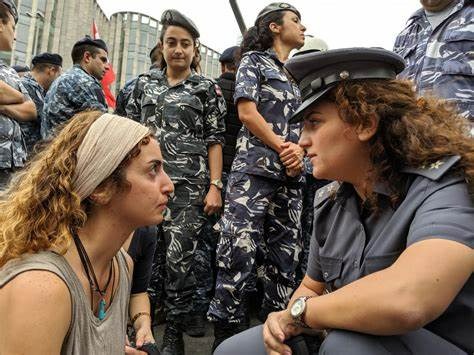Strategizing from 7 cities across the globe
Women's Political Participation in Lebanon: A Different Analytical Perspective
Women's political participation is one of the main pillars of achieving justice and democracy. Their representation in parliament reflects their ability to defend their rights and causes. However, the presence of Lebanese women in the political scene remains limited, due to the prevailing male culture that perpetuates men's dominance over decision-making positions. Lebanese women were granted the right to vote for the first time in 1953, on the condition that they obtain at least a primary education certificate, which placed additional restrictions on their participation.
LAWCIVIL SOCIETYDEMOCRACYPOLITICS
Mohammad-Chahir Najib
12/29/20244 min read


Women's political participation is one of the main pillars of achieving justice and democracy. Their representation in parliament reflects their ability to defend their rights and causes. However, the presence of Lebanese women in the political scene remains limited, due to the prevailing male culture that perpetuates men's dominance over decision-making positions. Lebanese women were granted the right to vote for the first time in 1953, on the condition that they obtain at least a primary education certificate, which placed additional restrictions on their participation.
The reality of women's representation in the Lebanese parliament
Currently, Lebanon ranks 18th among Arab countries in terms of the percentage of women in parliament and it is one of the few countries that did not adopt the women's quota system. In the 2022 elections, only eight women were able to enter parliament out of 118 women who ran, namely: Paula Yacoubian, Cynthia Zarazir, Ghada Ayoub, Najat Saliba, Halima Kaakour, Inaya Ezzedine, Strida Geagea, and Nada Boustani.
Despite the efforts of some of them in parliamentary and social work, the political performance of women in parliament remained modest, as it was limited to participation in parliamentary committees, social activities, and media initiatives. Most of them focused their efforts on strengthening their presence within their electoral districts, without achieving joint cooperation or integration in legislative efforts that promote women's issues.
This is due to the nature of winning, which often depends on partisan or political motives, where the parliamentarian becomes a mere representative of the party that nominated her, without having an independent vision or goals that serve the public interest or women's issues in particular. Therefore, the challenges remain great in achieving effective women's participation, capable of bringing about tangible change at the legislative and social levels.
Obstacles that hinder women's effective participation
Men largely dominate the Lebanese political landscape, as laws are formulated according to their lifestyle based on competition and control. Parties show little interest in empowering women, limiting themselves to secondary and formal roles, despite forming committees concerned with women's affairs and raising supportive slogans that remain empty of actual mechanisms for change. The situation is exacerbated by electoral laws that hinder women’s access, especially in light of the adoption of the proportional system with the preferential vote within small districts, which weakens their chances in the face of family and sectarian alliances.
In addition to the above, women candidates in Lebanon face social challenges that affect their chances of political success. The 2018 and 2022 elections demonstrated the limited representation of women, as only six women out of 86 candidates won in 2018, and 8 out of 118 candidates in 2022. This is due to several factors, most notably the dominance of political loyalty over gender considerations among voters, in addition to other social challenges. For example, gender discrimination remains prevalent despite international efforts, such as the establishment of the European Union’s Gender Parity Foundation in 2007.
Lebanese society also suffers from a lack of education in political culture and training in community work, which limits women’s ability to engage effectively in politics. In addition, women’s participation in parliament reflects the dominance of family political heredity, as most women who reach the council come from well-known political families. These factors highlight the need to create a political and social environment that promotes women’s effective and independent participation.
Women’s Participation in Elections as Voters
Women in Lebanon are a voting force that exceeds their male counterparts, as they constitute 50.8% of registered voters on electoral lists, compared to 49.2% for men. However, there is a major paradox in their political representation, as women’s representation in Lebanese parliaments did not exceed 5.4% in the 2018 elections, falling to 4.6% in the 2022 elections. Despite this significant presence of women as voters, women’s votes have not succeeded sufficiently in supporting female candidates.
Women voters play a vital role in elections, as electoral campaigns target them in two different ways. The first is traditional, focusing on attracting male voters to ensure that the women in their families vote in the same direction. Therefore, those who adopt the traditional method of winning the votes of female voters do not give importance to the presence of women and their participation in their electoral campaigns, but rather rely on male authority to convince women with ease. As for the second modern method, it focuses on educated and professional women through women's associations, with the aim of raising their awareness and attracting their votes independently, while including women's issues and rights in electoral programs. We have begun to witness a clear focus on educating female voters and attracting their interest by strengthening the role of women's associations that are concerned with women's rights and seeking to improve their social status. Many candidates have begun to rely on well-thought-out slogans that address women's minds and touch their aspirations in their electoral programs, in a serious attempt to win their votes.
The role of female voters in the electoral process as delegates
When talking about the role of delegates, the prominent and advanced role that women play year after year in this field cannot be ignored. Despite the hardship and difficulty of work during the electoral process, we find a large number of women working as delegates for different candidates. It is noteworthy that the role of female delegates is not limited to a specific age group, as young women can be observed in some centers, while women from middle age groups play an active role in other centers.
Field observations clearly indicate that political parties and movements rely on the female element, as they are assigned the role of delegates in female polling stations due to their ability to persuade, closely monitor, and carefully observe. In the 2022 elections, a wide spread of female delegates was observed in front of women's polling stations, as they showed continuous communication with female voters, repeating expressions of loyalty, and emphasizing the need to return the political favor to candidates by voting. Their efforts also included reminding which candidate should be given the preferential vote, which reflects the extent of this group’s effectiveness in influencing the electoral process.
This proposal raises fundamental questions about the role of women in the political scene: Were they partners in establishing men’s dominance over power? Can they be considered actual partners in reaching the critical political situation that Lebanon is suffering from today? These questions call for a deep discussion about the extent of women’s influence, whether through their direct political participation or through their involvement in systems that reinforce male dominance. It also requires a comprehensive review of their role in political decision-making and their ability to present alternative visions that contribute to achieving real change on the political and social landscape.
